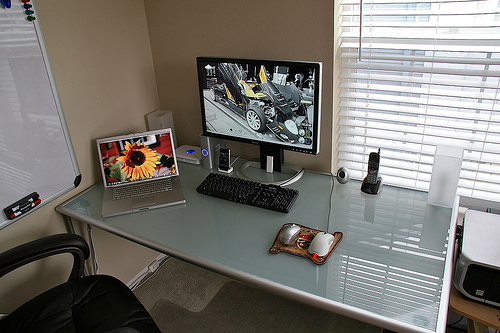There are a lot of descriptions of people who work for themselves. If you take on contracts for creative work, you can be a freelancer or an independent contractor. If you’re looking to build something bigger down the road, you might be an entrepreneur — or you might just be a small business owner. Nomenclature can be very important: because most of these titles have fairly common interpretations, people can tell a lot about you depending on which one you choose.
Freelancer: Freelancers are almost always individuals working on their own, usually in a creative field. A freelancer works on projects for clients, either for one client at a time or for multiple clients. In my experience, freelancing is one of the more common ways for people to strike out on their own. That’s at least partially due to the fact that many freelancers started out working on client projects while still also working for an employer.
Permalancer: Permalancers are a relatively new iteration of freelancers. Some companies (usually large — like MTV) rely on creative talent and hire freelancers, who are expected to put in forty hours of work a week indefinitely from the company’s office. On the surface, most of us would consider permalancers to be employees without benefits, but legally a permalancer is usually considered to be self-employed and can do things like write off business expenses as deductions, at least until the IRS decides to reclassify a company’s permalancers and demand payroll taxes.
Independent Contractor: The term ‘independent contractor’ is a broad one and can include freelancers, consultants and more. Usually an IC, as some companies abbreviate the term, is an individual providing a service, although I’ve seen companies refer to small businesses providing services as independent contractors as well. It’s a classification that’s often used to figure out who to send what forms to. If you are asked to submit a W-9 form from a business that has paid you money, you’re probably considered an independent contractor.
Consultant: The plural of ‘consultant’ seems to be ‘consulting firm’ these days. While a consultant may work on her own, she may also be part of a company (or the owner of that company). As far as job descriptions go, a consultant usually goes into someone else’s business and tells the owner how to do a specific thing. It’s less common for the consultant to actually do the work, though not unheard of — a consultant may have a team on tap to implement the course of action she suggests.
Virtual X: In certain fields, virtual workers are fairly common. Virtual assistants are particularly so. A VA may specialize in certain types of work (including creative work that freelancers also do) or handle general administrative tasks. There are also companies that organize groups of employees to act as virtual workers, mostly in countries like India or the Philippines. But there are also plenty of independent VAs. A VA’s client is usually a small business or an independent worker.
Independent Worker: You’ll commonly find ‘independent worker’ used as a catchall for any individual who doesn’t work for an employer and who also doesn’t have any employees of her own. It’s just that plain and simple.
Solopreneur: Just like the name says, a solopreneur works on her own. The big difference between a solopreneur and most of the titles above is that a solopreneur is often offering products rather than services. Because the title has especially caught on in certain online circles, those products are likely to be electronic, such as ebooks. But they can be anything that one person can bring to fruition without hiring employees.
Entrepreneur: Many of the definitions of entrepreneur revolve around a question of risk. An entrepreneur starts a new venture (or more than one), taking on the risk involved, with a goal of building something beyond just herself. She may start as a one-person operation, but most entrepreneurs have visions of bringing in employees and growing a big business.
Small Business Owner: Most small business owners go through a larval stage of entrepreneurship at some point. But this title conjures up an image of something stable. For most of us, it creates the idea of a small office or store with just a few people working. According to the U.S. Small Business Administration, though, a small business is anything with less than 500 employees.
Startup Owner: Where a small business owner or an entrepreneur is usually in their business for the long haul, the most successful startups are built with an exit strategy in mind. Whether the startup owner (or owners) want to be bought, bring in a management team and have an IPO or something else entirely, I wouldn’t generally describe them as people who will still be doing the exact same work even five years from now.
The Evolution of Titles
Personally, my choices of how to describe what I do have been shifting. When I first started out on my own, I knew that I was a freelancer down to my bones. But I started freelancing about eight years ago. It’s natural that my own understanding of what I do has evolved. These days, I consider myself an entrepreneur more than anything else — though, within the right context, I will refer to myself as a consultant or a small business owner. That’s a bit of a personal problem: most people aren’t crazy enough to try to run what really amounts to three companies at once.
This sort of evolution is absolutely common. I’ve seen virtual assistants become consultants, freelancers become startup owners and so on. But I also know people who have stuck with one title for twenty years or more. Just like the fact that you have to decide for yourself which of these options works for you, you have to decide if your title is going to change down the road.
Image by Flickr user Vince Welter
